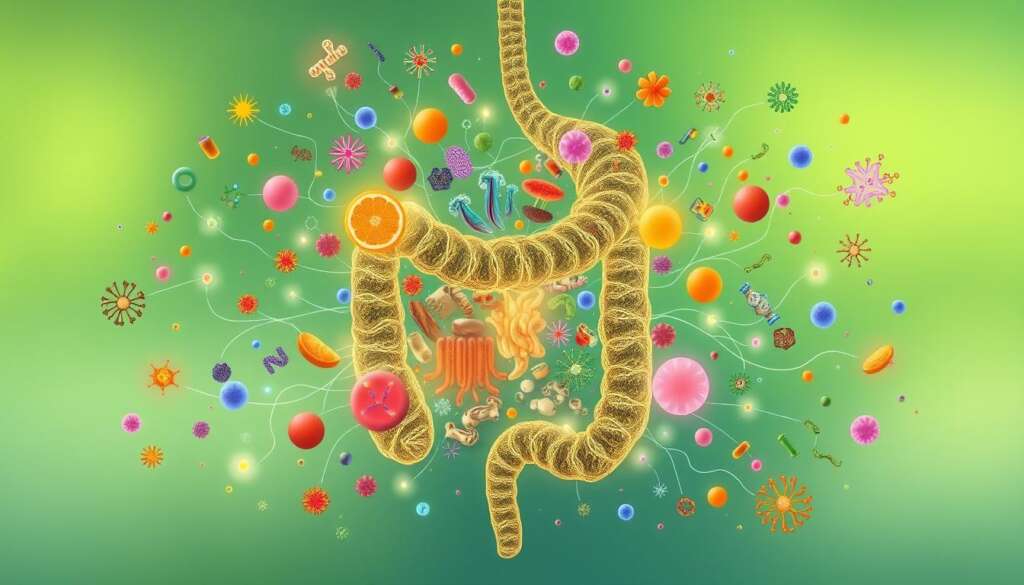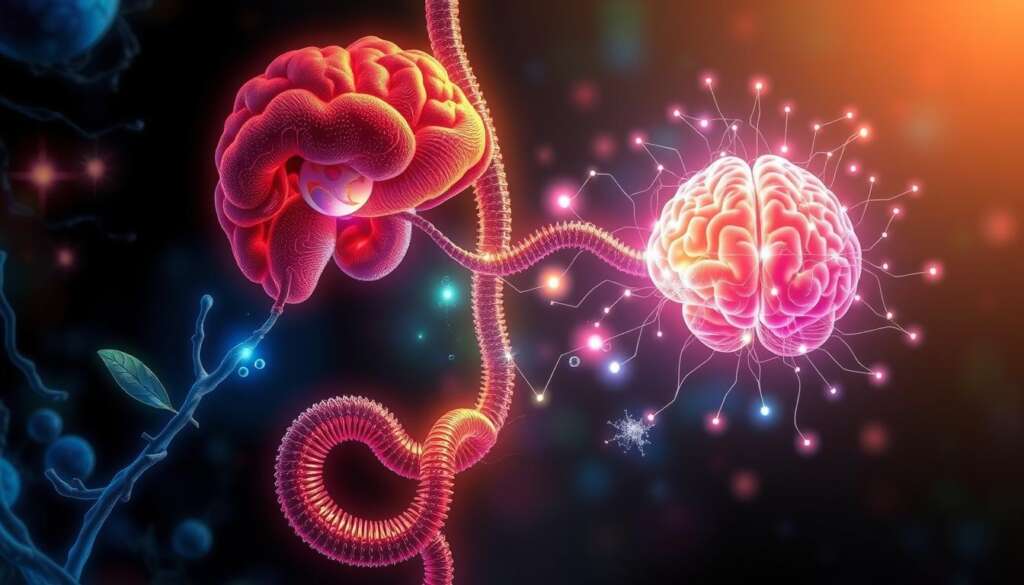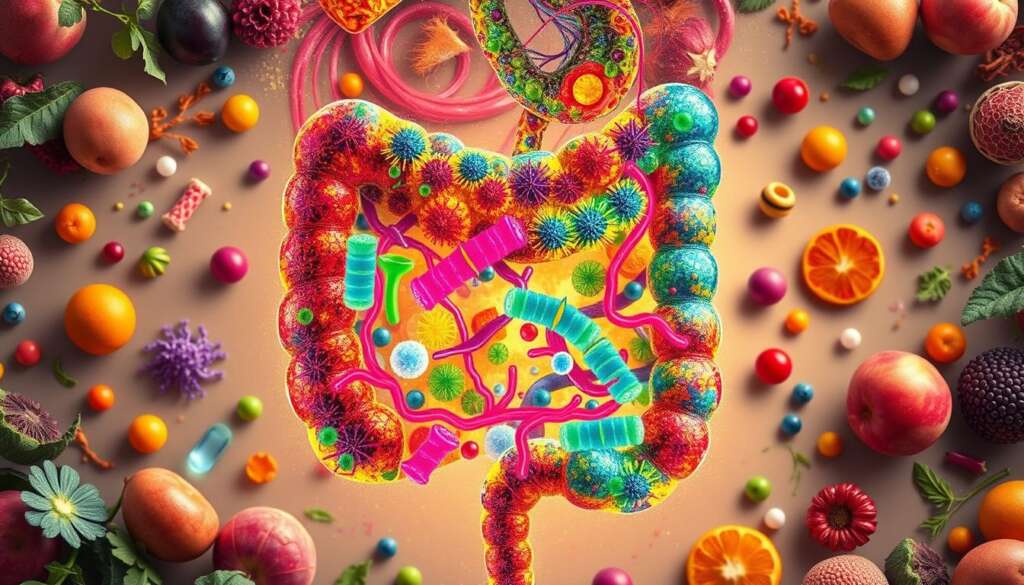I’m excited to share how gut health affects our overall wellness. Research shows that our gut microbiome is key to feeling good. We’ll see how gut bacteria affect digestion, nutrient absorption, and even our mental health and immune system.
The gut microbiome is a complex world of trillions of microorganisms in our digestive system. When in balance, these bacteria help us digest food and control inflammation. Learning about this connection can help us improve our health and energy.
We’ll look into the benefits of probiotics and prebiotics. We’ll also explore the gut-brain axis and how gut health affects our immune system and inflammation. By the end, you’ll understand the importance of gut health for wellness.
The Role of Gut Health in Overall Wellness: What Science Says
Recent studies have shown that gut health is key to overall wellness. The gut microbiome, filled with trillions of microorganisms, affects both physical and mental health. Let’s dive into the latest scientific evidence on the gut-health and wellness link.
Research indicates that the balance of gut bacteria is vital for digestion, nutrient absorption, and immune function. A disruption in this balance can cause health problems, from digestive issues to chronic inflammation and mental health issues.
“The gut microbiome is now viewed as a virtual organ that plays a pivotal role in overall health and disease risk.”
The gut-brain axis shows how gut health impacts mental well-being. Scientists have found that gut imbalances can lead to anxiety, depression, and neurodegenerative diseases.
The gut health and overall wellness connection also affects the immune system. The gut microbiome helps regulate immune responses. Disruptions can cause increased inflammation and make us more prone to illnesses.
Understanding the importance of gut health in overall wellness helps us take care of our gut microbiome. We can improve our well-being through diet and lifestyle choices.
Understanding the Gut Microbiome
The gut microbiome is a complex ecosystem filled with trillions of bacteria, viruses, and other microorganisms. These tiny creatures live in our digestive tract and play a big role in our health. They help with digestion and keep our immune system strong. It’s important to understand how to keep this balance healthy.
The Delicate Balance of Gut Bacteria
Our gut bacteria work together in a delicate balance. Each one has its own job that helps us stay healthy. If this balance gets upset, we can face problems like digestive issues and chronic inflammation. It’s crucial to keep our gut microbiome diverse and thriving for our well-being.
Factors Influencing Gut Health
Many things can affect our gut bacteria, like what we eat and our lifestyle. Even our environment can play a role. Every choice we make can help or harm our gut microbiome. Knowing what affects our gut health is the first step to supporting our digestive system.
“The gut microbiome is the new frontier in health and wellness, with the potential to transform our understanding of the human body and its relationship to the world around us.”

Probiotics: The Friendly Bacteria
In the world of gut health, probiotics are the heroes we often overlook. These live microorganisms are the “friendly” bacteria that help keep our gut healthy. They are part of the delicate ecosystem in our digestive system.
Probiotics, like Lactobacillus and Bifidobacterium, work hard to keep the balance of beneficial bacteria in our gut. They push out bad microbes and make important nutrients. This helps our gut stay strong and improves our overall health.

The ways probiotics help our health are amazing. They can improve nutrient absorption, boost our immune system, and even influence the gut-brain axis. This can lead to better mental health. Research also shows they might help reduce inflammation and support a healthy response to it.
Adding probiotics to your daily life is a simple but effective way to boost gut health. You can get them from fermented foods, supplements, or a mix of both. These beneficial bacteria help keep your body balanced and bring many benefits to a healthy gut microbiome.
Prebiotics: Feeding the Good Gut Bacteria
Keeping our gut microbiome healthy is key to feeling good. Prebiotics are a type of fiber that feed the good bacteria in our gut. They help our gut flora stay balanced and healthy, supporting our overall health.
Dietary Sources of Prebiotics
Adding prebiotics to your diet is easy. Many whole foods are full of prebiotics, like onions, garlic, bananas, whole grains, and legumes. These foods have fiber that our bodies can’t digest but our gut bacteria can.
“Feeding the good gut bacteria with prebiotics is like nourishing the foundation of your overall health and wellness.”
Trying different prebiotic-rich foods can boost your gut health. You can find prebiotics in everything from veggies to avocados. Eating prebiotics regularly can help your gut bacteria grow, leading to better health.

Gut Health and Digestion
Keeping your gut healthy is key for good digestion and nutrient use. The gut microbiome, filled with trillions of microorganisms, is vital for digestion. It affects how our bodies use the nutrients we eat.
Nutrient Absorption and Gut Health
A balanced gut microbiome helps break down and absorb important nutrients. This includes carbs, proteins, fats, vitamins, and minerals. The good bacteria in your gut make enzymes that help digest food, making nutrients available for your body.
When your gut health is off, you might not absorb nutrients well. This can lead to deficiencies and digestive problems.
“A healthy gut is the foundation for optimal nutrient utilization and overall digestive function.”
The gut microbiome also helps control your digestive tract’s movement. This helps you have regular bowel movements and avoid constipation or diarrhea. By keeping your gut flora diverse and balanced, you can improve gut health, digestion, and nutrient absorption.
Eating probiotic and prebiotic foods, and living a lifestyle that supports gut health, can help. These actions can make your gut microbiome thrive. This boosts your body’s ability to get and use the nutrients it needs for health.
The Gut-Brain Axis
Research has found a strong link between gut health and mental wellbeing, known as the gut-brain axis. This system lets the gut and brain talk to each other. It affects how we think, feel, and handle emotions. This connection is key to overall wellness.
Gut Health’s Impact on Mental Wellbeing
The gut microbiome, a group of microorganisms in our gut, greatly affects our mental health. Studies show that the gut and brain share signals. A healthy gut helps make neurotransmitters like serotonin and dopamine, which improve our mood and stress levels.
“The gut is often called the ‘second brain’ because of its many neurons. This connection between the gut and brain is a fascinating area of research.”
On the other hand, an unbalanced gut microbiome, or dysbiosis, can lead to mental health issues. These include anxiety, depression, and problems with thinking. By focusing on gut health, we might find new ways to support our mental wellbeing.

As scientists learn more about the gut-brain axis, we see new ways to manage mental health. By taking care of our gut through diet, lifestyle, and probiotics, we can improve our mental state. This helps create a stronger connection between our body and mind.
Gut Health and Immune Function
Recent studies highlight the crucial link between gut health and a strong immune system. The gut microbiome, a mix of microorganisms in our gut, is key to our immune function.
A healthy gut microbiome boosts our immune system. It helps our body fight off sickness and disease. The gut’s immune cells and chemicals work with the microbiome to keep everything balanced.

But, an imbalance in the gut microbiome, or dysbiosis, harms our immune function. This makes us more likely to get sick and can lead to autoimmune diseases. Taking care of our gut health helps our body’s defenses and improves our overall health.
“A healthy gut is the foundation for a strong and balanced immune system.”
To support a healthy gut and immune system, eat probiotic-rich foods and prebiotic-rich fibers. Also, reduce stress. Knowing how gut health and immune function are connected helps us take better care of our health and stay resilient.
Gut Health and Inflammation
Research shows a strong link between gut health and inflammation. Our gut microbiome is key in controlling body inflammation. If it’s out of balance, it can lead to chronic inflammation and health problems.
The Role of the Gut in Chronic Inflammation
The gut microbiome, full of bacteria, fungi, and more, controls our body’s inflammation. Gut health and inflammation are closely tied. An imbalance in gut flora can start inflammation, causing chronic inflammation in the body.
This ongoing inflammation is linked to many health issues. These include autoimmune diseases, heart disease, mental health problems, and cancer. Knowing how gut imbalance fuels inflammation helps us fight these diseases.
“The gut microbiome is like a rainforest, with a delicate balance of diverse species that work together to maintain a healthy ecosystem. When that balance is disrupted, it can have far-reaching consequences for overall well-being.”
To keep chronic inflammation away, we need a healthy gut. Eating well, managing stress, and other lifestyle choices help. By understanding the gut-inflammation link, we can make better choices for our health.
Dietary Habits for Optimal Gut Health
Keeping your gut healthy is key to feeling good overall. What you eat greatly affects your gut’s health. Eating a variety of fiber-rich foods, fermented items, and other nutrients is vital for a healthy gut.
Eating more fiber is a top tip for a healthy gut. Foods like fruits, veggies, and whole grains are full of soluble fiber. This fiber feeds the good bacteria in your gut, helping it stay balanced and aiding digestion.
“A diverse, fiber-rich diet is essential for nurturing a thriving gut microbiome and supporting overall digestive health.”
Adding fermented foods like yogurt, kefir, sauerkraut, and kimchi to your diet is also good for your gut. These foods are packed with probiotics, the good bacteria that help keep your gut balanced.
By eating a diet full of fiber, fermented foods, and other nutrients good for your gut, you help keep your gut microbiome healthy. This is great for your overall health and wellbeing.
Lifestyle Factors Affecting Gut Health
Our diet is key to gut health, but lifestyle also matters a lot. We’ll look at how stress, sleep, and exercise affect our gut. We’ll find ways to improve these areas for better gut health.
Stress: The Gut Health Saboteur
Stress can harm our gut health a lot. Stress hormones like cortisol can mess with our gut bacteria and cause inflammation. People under stress often have less diverse gut bacteria, which can lead to health problems. It’s important to manage stress well, like through mindfulness or relaxation.
The Sleep-Gut Connection
Good sleep is vital for a healthy gut. Not sleeping well can change our gut bacteria and cause inflammation. Poor sleep is linked to less diverse gut bacteria and more health issues. Try to sleep 7-9 hours a night and keep a regular sleep schedule.
Exercise: A Gut-Friendly Habit
Exercise is great for our gut. It can make our gut bacteria more diverse and lower inflammation. Activities like walking or cycling can help our gut. Make exercise a regular part of your life for better gut health.
By focusing on stress, sleep, and exercise, we can improve our gut health. This can lead to better overall wellbeing.
Conclusion
Gut health is key to feeling your best. It affects digestion, mental health, and more. By learning about gut health, we can improve our overall wellness.
Research shows that a healthy gut is essential for good health. Making smart food choices and managing stress can help. These actions support a balanced gut microbiome.
Starting small can lead to big changes in gut health. Adding gut-friendly foods and habits to your day can boost your health. This journey is all about making your body and mind stronger.

